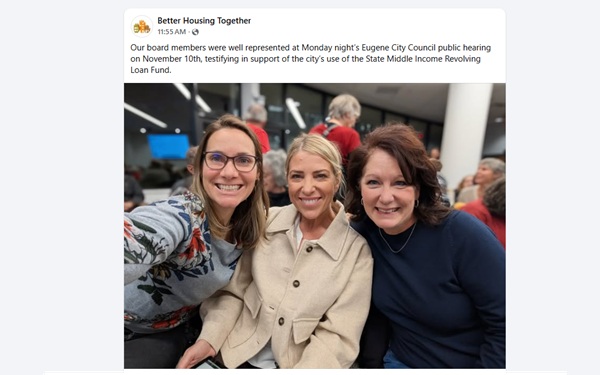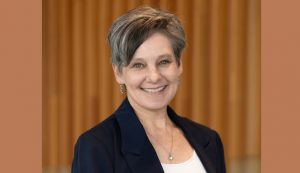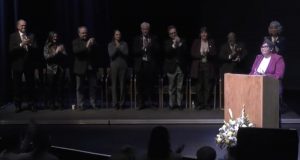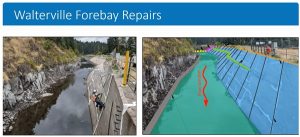City interested in $50M moderate-income revolving loan program
8 min read
Presenter: The state of Oregon has created a $50 million revolving loan fund for housing. On Nov. 10, public comments urged Eugene to take advantage of the opportunity.
Emily Reiman: My name is Emily Reiman. I’m here as the CEO of DevNW. We have completed or currently-under-construction projects in Wards 3, 7, and 8.
[00:00:19] I’m here to encourage the city and Council to adopt and enable several sources of state funds that have recently been allocated by the legislature for affordable housing and workforce housing, but we need the city to act to be able to utilize these funds for local projects here in Eugene.
[00:00:37] We’ve had big wins over the last couple of years enabling these state dollars, but if the city and Council don’t act, we won’t be able to bring them to local projects. That’s DevNW, and that’s other developers as well.
[00:00:48] Two immediate examples: Business Oregon has $10 million in grants for infrastructure that is needed to build housing. The city is needed to co-sponsor the applications with a developer. DevNW has a project that we’re interested in submitting for those funds, but we can’t do it without city support.
[00:01:05] OHCS has even more money. They have $50 million for MIRL, the middle income revolving loan program. But in that case, Council needs to adopt a resolution to enable the program here locally. And the city needs to adopt an application process for developers to apply for those funds.
[00:01:21] It’s essentially a tax increment financing program where a state loan for zero interest can go into the project on the front end, and it gets paid back through the first 10 years of property taxes from the new homes that are developed.
[00:01:34] Time is of the essence. The infrastructure applications are due to Business Oregon by Dec. 17, so we have just a little over a month to enable that process to happen. And we need MIRL to be activated by the city, not awards made, but activated by the city in the beginning of 2026 so that those of us developers who want to use it can have it as match funds, when we go in for applications for state and federal funding in the 2026 funding rounds.
[00:02:01] We urge Council to act quickly. We urge you to support staff in finding the capacity to enable these programs. And DevNW is committed to being at the table to try to do as much of the lifting on the applications, providing model resolutions, providing model applications from other communities to try to minimize the impact on staff, but this money is really urgently needed to address the housing crisis in Eugene.
[00:02:23] Brooke Standifer: My name is Brooke Standifer and I serve on the board of Better Housing Together. So tonight I want to talk about an opportunity to get more middle income housing built in Eugene.
[00:02:33] I’m going to talk about the middle income revolving loan fund or MIRL. I know you heard from Emily a minute ago. I’m going to talk a little bit more about it. Hopefully give you some other information so you’re not hearing the same thing.
[00:02:45] You’ve already made huge housing strides this year, and the MIRL program really builds on that success by serving households in the 80 to 120% AMI range. That’s our teachers, our nurses, our tradespeople who earn solid wages but are being priced out as the median home price tops $450,000 in Eugene.
[00:03:05] So I know we’re all hearing a lot of acronyms tonight, or at least I’m hearing some new ones. So I’m going to tell you a little bit more about MIRL.
[00:03:13] The state has set up a MIRL, so the middle income revolving loan fund. And that was created through Senate Bill 1537 in 2024. So that revolving loan fund, that’s a proven concept in Eugene. We’ve been doing it in Eugene for small businesses, and we can apply that same successful model to housing.
[00:03:31] So the state has set aside $75 million for the MIRL program. That’s $50 million in the first two years and $25 million after that through Oregon Housing and Community Services, or OHCS.
[00:03:42] And cities like Eugene can borrow from that pool at zero interest, like Emily said, and use those dollars to help private or nonprofit developers close the gap on projects that otherwise wouldn’t pencil. As those loans are repaid, the funds go right back into the pot, ready to support the next wave of houses. That’s the revolving part.
[00:04:02] Over the past few months, Better Housing Together has done the groundwork. We’ve met with the county assessor, city staff, OHCS, and others, and we’ve drafted an application and a sample resolution based on the MUPTE framework so the city can move quickly. So this program is ready for Council direction.
[00:04:18] We also recognize staff’s thoughtful concerns about risk and capacity. That’s why Better Housing Together is working with local banks and credit unions and the Eugene Chamber of Commerce to identify ways to reduce risk and minimize the administrative burden.
[00:04:32] So in closing, this is a state-funded zero-interest loan, and it’s really an opportunity for Eugene to be a leader in this space. Only two other cities in Oregon have taken advantage of MIRL so far.
[00:04:45] Tiffany Edwards: My name is Tiffany Edwards, and I’m here tonight speaking as a board member for Better Housing Together, a nonprofit coalition advocating for housing affordability, supply, and choice. First, I want to express deep gratitude to each of you for your service to this community and providing these opportunities away from your families to hear from community members.
[00:05:05] And while there’s a good showing of people here tonight, I know that there are many thousands of others who can’t always be here and you don’t always hear from.
[00:05:14] Thank you, Council, for your approval of the LIRHPTE (low income rental housing property tax exemption) for The Lucy, a new Cornerstone development. This decision directly supports the creation of homes that will make a tangible difference for many families and individuals.
[00:05:26] Cornerstone is an incredible asset to have in our community. For more than 30 years, they’ve provided safe, affordable homes and wraparound services that help hundreds of families, seniors, and community members each year finds stability, build skills, and thrive. Their work changes lives, and your LIRHPTE approval helps make more of that possible. So thank you.
[00:05:47] Second, I’d like to encourage to keep in that same spirit of partnership and action as you consider implementing the middle income revolving loan fund or MIRL here in Eugene. The legislature allocated $75 million statewide for this program in 2024 administered through OHCS. And to participate, Eugene would simply need to adopt the local ordinance or resolution and coordinate with your county assessor.
[00:06:15] If we want to see certain outcomes, we need to make things easier to do than anything else. So if we want to see more housing in our downtown, more housing that’s affordable, or more housing choices across Eugene, we have to make it as easy as possible for builders and developers to choose to invest here.
[00:06:32] Tools like the MUPTE, LIRHPTE, and the MIRL are among the few levers that the city can control. These are practical, ready-to-go solutions that send a strong message that Eugene welcomes and values those who help create the homes our residents desperately need.
[00:06:49] Thank you for your leadership and for continuing to make housing at all income levels a top priority for this community.
[00:06:55] Presenter: Following the public comment Monday, city councilors asked to learn more. Councilor Matt Keating:
[00:07:02] Councilor Matt Keating: I want to thank folks from Better Housing Together and from Cornerstone for joining us tonight and thank you for the work you’ve done throughout the community to provide affordable housing opportunities and pathways for permanent supportive housing. It’s greatly appreciated.
[00:07:18] I appreciate the opportunity to meet face-to-face last week as well. So (lists names) …and I know I’m missing someone, so I apologize. But I greatly appreciate housing advocates coming to Council tonight to inform and to amplify some tools in our tool belt, or possibly in our tool belt, as authorized by the legislature in 2024. So I appreciate that amplification, and I look forward to next steps.
[00:07:55] Presenter: Eugene City Councilor Mike Clark:
[00:07:58] Councilor Mike Clark: I don’t know what work has been done by staff so far with regard to preparation of taking advantage of the new state legislation for the MIRL opportunity of funding, but I would like to advocate for taking the next step, so I’m wondering whether that involves a work session poll or what to get that resolution to council to vote.
[00:08:22] Presenter: Councilor Randy Groves:
[00:08:23] Councilor Randy Groves: I had the same question as Councilor Clark. I would like to learn more about that as well. I’ve heard about it, but I would like a more in-depth understanding.
[00:08:32] Presenter: City Manager Sarah Medary:
[00:08:34] Sarah Medary (Eugene, city manager): Yeah, so we have been working on this and working with the advocates and others trying to understand it. So I don’t think it’s ripe for a poll just yet. You’ve already adopted a housing implementation pipeline and I think I need to understand better: How does this tool fit in, and do you need a poll, or is it something we can just bring forward? So I think I just need to follow up with you…
[00:08:58] Presenter: During the work session Wednesday, Councilor Mike Clark:.
[00:09:02] Councilor Mike Clark: On the MIRL incentives: Can you give us more information about that and what’s necessary for that to come forward and get active in a timely fashion?… I would want to do everything possible for us, especially considering the MIRL program for us to move as expeditiously as possible…
[00:09:24] So if that’s coming forward from the staff, great. I prefer us, frankly, to see votes rather than head nods so that there’s no miscommunications. But I’d like to be moving as quickly as possible towards those incentives.
[00:09:42] Presenter: Also speaking Wednesday, Eugene’s Mayor Kaarin Knudson:
[00:09:46] Kaarin Knudson (Eugene, mayor): I also will just indicate my full support for the implementation and development of our partnership with a moderate income revolving loan fund project locally.
[00:09:57] I thought the public comment from DevNW and others in the community at Monday night’s meeting was incredibly helpful in that they also laid out some timelines that that project is working towards.
[00:10:08] And for us to be able to take advantage of a tool and have it be within the time frame that it is most useful to a project that’s on deck, that is a great opportunity that’s before us.
[00:10:21] Presenter: The City Council asks for more information about MIRL, the moderate-income revolving loan program.





